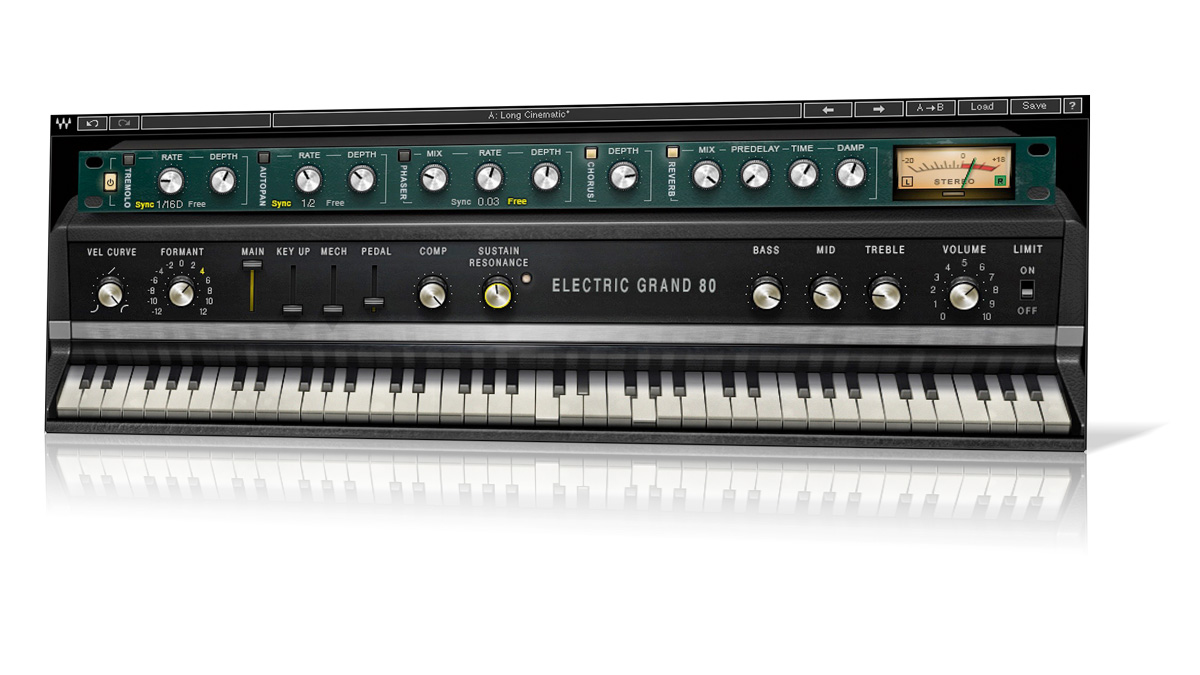MusicRadar Verdict
Electric Grand faithfully recreates the sound of Yamaha’s revered piano, plays beautifully and throws in a few tasty extras to boot.
Pros
- +
Sounds just like the real deal.
- +
Four mixable channels of notes and noise.
- +
Handy effects.
- +
Formant filter works well.
Cons
- -
Surprisingly hefty CPU hit.
MusicRadar's got your back
A sample-based emulation of the classic Yamaha CP-80 electric grand piano, as made legendary in the 80s by the likes of Elton John, Phil Collins, Peter Gabriel, Toto, Herbie Hancock and many more, Waves’ new instrument keeps things as simple as such a thing should be, but still manages to work in a handful of useful extras.
Built on a 500MB bank of multisamples captured at a range of velocities and with round- robin variations, Electric Grand 80 (VST/AU/AAX/ RTAS/standalone) employs separate sampler engines for the Main, Key Up/release, Mechanical and Pedal sounds, and the four faders controlling them make it a cinch to get your desired blend of notes and noises. Related to this, the Sustain Resonance knob dials in the sympathetic vibration of nearby strings to those being played when the sustain pedal is depressed, proving most effective for adding power and weight to held low notes and chords.
All keyed up
The response of Electric Grand 80 can be adapted to your playing style via the Velocity Curve knob (from logarithmic when fully anticlockwise, through linear at the centre detent, to exponential when clockwise), while tonal and dynamics shaping is provided by an onboard compressor, EQ, formant filter and limiter.
The Comp knob mixes in the output of the internal compressor for an increasingly punchy, less dynamic sound - although with no accessible controls, this is something of a ‘take it or leave it’ proposition. The three-band EQ is the same as that on the actual CP-80 minus the Brilliance switch, with a gain knob for each band. The Bass band is a low shelving filter, cornering at 203Hz; Mid is a bell filter at 900Hz; and Treble is a high shelf, cornering at 1.875kHz. All three offer up to 18dB of cut or boost, and are perfectly adequate for applying quick tonal tweaks without resorting to an external EQ plugin.
The Yamaha CP-80 featured a three-band EQ and a Tremolo module, both of which are included in Waves’ reimagining of it, along with four further effects.
The Tremolo is the same as the original, but with the addition of host sync (from 2/1 to 1/32, with dotted and triplet options) to the free-running 0.25-28Hz speed range.
More modulation-based processing comes in the shape of Autopan, Phaser and Chorus effects. The last of these is generated by four LFO-controlled delays but only permits adjustment of Depth, while Autopan and Phaser both include synced and unsynced speed adjustment as well as Depth control and, for the Phaser, a wet/dry Mix knob.
The Reverb effect’s four controls let you set the reverb Time, Predelay, high-frequency Damping and Mix balance.
Each effect has its own bypass button, and all can be knocked out collectively with the global bypass at the left-hand end of the rack.
Definitely not something found on the Yamaha original, the Formant knob brings unconventional filtering into play. Ranging from -12 to +12, setting it to -5, say, changes the character - but, crucially, not the pitch - of the piano to that of the notes five semitones below those being played. It works well as a broad- strokes tone control, complementary to the EQ.
Finally, the master volume control is followed up by a 0dB brickwall limiter on the output for preventing overs; and the VU peak meter, calibrated for 18dB of headroom, features separate needles for the left and right channels.
Electric Grand 80 sounds as near as dammit to the real thing as any CP-80 emulation we’ve heard, with the four mixable sound sources opening up plenty of raw sound customisation, and the Formant filter making a helpful partner to the standard EQ. The effects are a great touch, too, placing enough signal processing within the instrument itself to enable considerable enhancement, polishing and transformation without complicating the workflow.
Want all the hottest music and gear news, reviews, deals, features and more, direct to your inbox? Sign up here.
If the very particular sound of the CP-80 is something you have a need for in your productions, Waves’ virtualisation of it is an affordable, thoroughly convincing stand-in for the real thing.
Computer Music magazine is the world’s best selling publication dedicated solely to making great music with your Mac or PC computer. Each issue it brings its lucky readers the best in cutting-edge tutorials, need-to-know, expert software reviews and even all the tools you actually need to make great music today, courtesy of our legendary CM Plugin Suite.

